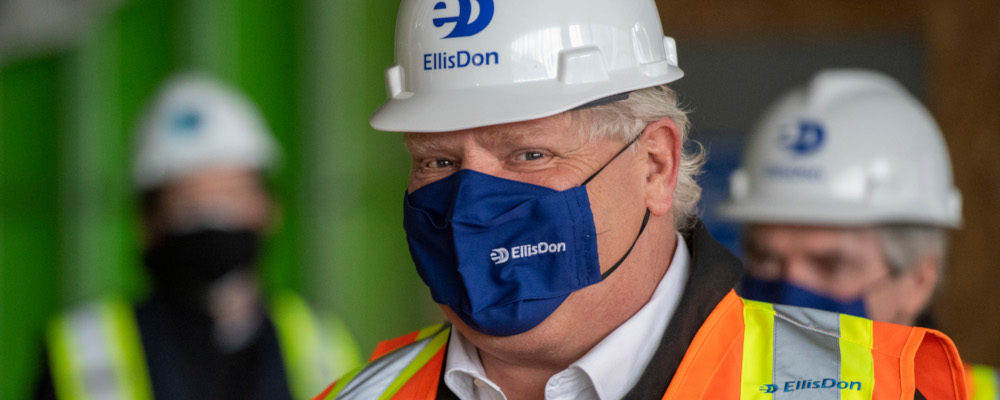The Ontario provincial election campaign is starting to ramp up. With just seven months to E-Day, Doug Ford’s Progressive Conservatives (PCPO) have established a regular cadence of press conferences, policy announcements and campaign ads.
And with these press conferences, announcements, and ads a theme is beginning to emerge.
What do you think about when you think about Doug Ford and the PCPO? (Let’s set COVID-19 aside for this exercise.)
It might be the use of ministerial zoning orders to fast track housing development, which has drawn equal amounts of praise and criticism. It might be the proposal for a new highway in the Greater Toronto Area, Highway 413, which has also drawn equal amounts of praise and criticism.
Maybe it’s recent pronouncements by the premier that Ontario is looking to attract new immigrants who are ready to work and not those who aren’t. Again, equal parts praise and criticism.
More recently, you might think about new legislation that has been introduced by the ministry of labour to remove work certification barriers for immigrants and to ban or limit the use of non-compete agreements by employers.
As far as I can tell, this all points to a clear and compelling campaign theme:
“It’s time to build.”
In fact, this theme is made explicit in the party’s latest ad: “We are the only party looking to the future, and we’re ready to build.”
Liberal Party leader Steven Del Duca, for his part, has been reinforcing this theme, and falling on the other side of it, with his proposals for a four day workweek and a basic income pilot.
“It’s time to chill.”
If the recent federal election is any indication, this next provincial election will be mostly about one thing: housing.
Justin Trudeau and Erin O’Toole both made housing a priority in their campaigns, no doubt informed by survey data pointing to housing affordability as a top five priority across the country and the top priority in the GTA.
When going into a housing election, it’s probably a good idea to be positioned as the party that’s ready to build.
I’ve written before about how housing is expensive because there’s not enough of it, how there’s not enough of it because municipal land use rules stand in the way, and how municipal land use rules are enforced and defended by municipal councillors catering to their nimby-constituents.
Doug Ford should read that three-part sentence and think, “This is how I win.”
Here’s the thing: housing is most expensive in our large urban centres, and the decreasing affordability of surrounding regions is a direct consequence of not building much more housing in those large urban centres.
People work downtown but they live where they can afford to. They “drive till they qualify” and these days, that means farther and farther away.
Ontario’s three largest population centres are Toronto, Ottawa, and Hamilton.
In 2018, the PCPO didn’t win any ridings in Toronto outside of Etobicoke and south of Eglinton, any ridings in Hamilton at all, and just two of six ridings in Ottawa.
It may sound counterintuitive, but this could be a big opportunity for Doug Ford. While those cities’ municipal councillors might need to cater to their NIMBY constituents, along with the LPO and provincial NDP, the PCPO emphatically does not.
The PCPO has not yet revealed what the next phase of its Housing Supply Action Plan will look like, but it should, and soon. It should also be aggressive about it.
Housing is a great issue for conservatives for a few reasons.
First, as mentioned above, conservatives are uniquely able to position themselves in opposition to the architects of our housing crisis — namely, those urban progressive voters and municipal councillors who have prioritized neighbourhood character protection over new housing supply.
Second, housing affordability gets improved through deregulation (or land use liberalization), and conservatives love deregulation. It’s been their thing for the last 40 years, at least.
Third, conservative parties need to expand their base, and that means becoming more appealing to young urban professionals.
Housing affordability is an Uber-like issue. It benefits young urban professionals most of all, and requires a common-sense solution (bust the cartel!) that is broadly agreed upon on non-partisan terms.
Finally, improving housing affordability — that is, allowing for much more housing in large urban centres — would be a boon to productivity, innovation, and economic growth. Three more things that Conservatives love.
It might just be the perfect issue at the perfect time. Making the most of it, however, will require bold and direct policy action paired with clear and concise communication, and that’s not always been forthcoming from Doug Ford and the PCPO.
For the sake of everyone who would benefit from improved housing affordability (which is basically everyone), we should hope that they get this right.
It’s time to build.




